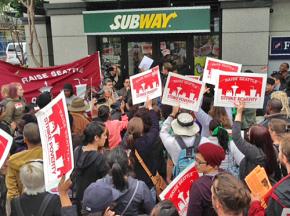Seattle joins the Fight for 15
reports from Seattle on actions by fast-food workers and their supporters.
CHANTING, "WE'RE fired up, we can't take it no more," striking fast-food workers in Seattle became the first city on the West Coast to get a visit from the fight for a $15 an hour minimum wage.
Fast-food workers around Seattle began their 24-hour strike on May 29 when workers at a Taco Bell in the Ballard neighborhood walked out at 10 p.m., shutting the store down. The next day, workers from Burger King, Taco del Mar, Subway, Chipotle and Qdoba walked out in a series of actions beginning in the morning and ending that evening. In total, job actions shut down 11 fast-food restaurants throughout Seattle.
About 300 fast-food workers and supporters gathered at 4 p.m. on May 30 for a rally in Denny Park. Organizers pointed out that two thirds of fast-food workers are women. Speaking to the crowd, Caroline Durocher from the Ballard Taco Bell said, "I'm on strike today to make a living wage, to make enough to eat, to afford bus fare, to live. When I went on strike and my store shut down, I felt like a person again."

Ethan Dittrich-Reed, a striking Qdoba worker and the MC of the rally, said that with what he makes, he still needs to rely on help from his parents to make ends meet. "These are the jobs of the future, and we need to make sure that we can live on them," he said.
Zachary Heim, a worker from Qdoba on Capitol Hill, was happy that low-wage workers are finally standing up and starting to take action. When asked to elaborate about the connection to recent actions against Monsanto, he said: "The stores we're picketing today are using Monsanto products. This is about the quality of the food and the treatment of the workers."
The gathering then marched down to 5 Points and picketed a Taco del Mar, shutting it down. Along the way, workers chanted, "Worker power's on the rise, now's the time to organize. No more bosses' tricks and lies, give our children better lives."
When asked why she's on strike, Samantha Gordon, a striker from Burger King in Sodo, said, "I don't make nearly enough for how bad I'm treated." On the goals of the action, Samantha commented, "I want to see the minimum wage rise. It doesn't even have to be $15 an hour, but even a few dollars would make a difference. We work too hard for too little." To other workers hesitant to walk out, she said, "Think about what you go through every day and ask if your work is more important than your well being."
The protest continued on to picket a Subway in Fisher Plaza. After chanting, "Walk out, we got your back!" for what seemed like 20 minutes, two workers walked out and shut the store down.
Pumped up, protesters decided to march to a nearby McDonald's.
McDONALD'S PROFITS for 2012 were $5.46 billion. McDonald's $27 billion in revenue makes it the 90th-largest economy in the world.
This highly profitable mega-corporation has no excuse not to pay its workers more. And yet, having employed at some point one in every eight Americans for miserable pay, the company is rightfully emblematic of the low-wage McJobs fueling the anger of fast-food and other retail workers organizing across the U.S.
Perhaps it was the escalating nature of the march--combined with this anger towards McDonald's particularly--that led workers to decide to enter and occupy the restaurant. The scene was exhilarating. Protesters filled the space and began chanting, "Keep the burgers and the fries, make our wages super-size!"
At the outset, workers seemed to melt into the kitchen, leaving a couple of managers to squirm at the registers. Striking workers from other locations used the people's mic to reach out to the McDonald's workers. One striker said: "Workers, we know you can hear us. Hundreds of workers walked out today to oppose poverty wages. Join us! We need you."
Another protester named Carlos told the crowd: "In this country, there's lots of opportunity, but a lot of injustice too. Latin people, we have a lot of dreams when we come to this country. Big companies make us fear for documents, and they take advantage of us. If we all can get together, we can make a bigger voice."
After a few more mic checks from other striking workers, the crowd chanted, "You don't need the bosses, the bosses need you!" At this point, the managers had hidden in the back too, leaving the counter completely unstaffed. After about 30 minutes, protesters left chanting, "We'll be back!"
Organizers were careful to avoid demands to form a union, as this would initiate many legal considerations. Dittrich-Reed, however, said that he personally thinks that workers need unions. "Right now, we need to spread this all over the country," he said. "There are people here from Portland checking out how we organized this to spread it there. It needs to be a recurring action."
At the wrap-up rally back in Denny Park, organizers said this is just the beginning, promising more actions in the future. With Seattle becoming the seventh city in a matter of weeks to mount such a campaign, future actions here and around the nation seem likely.


